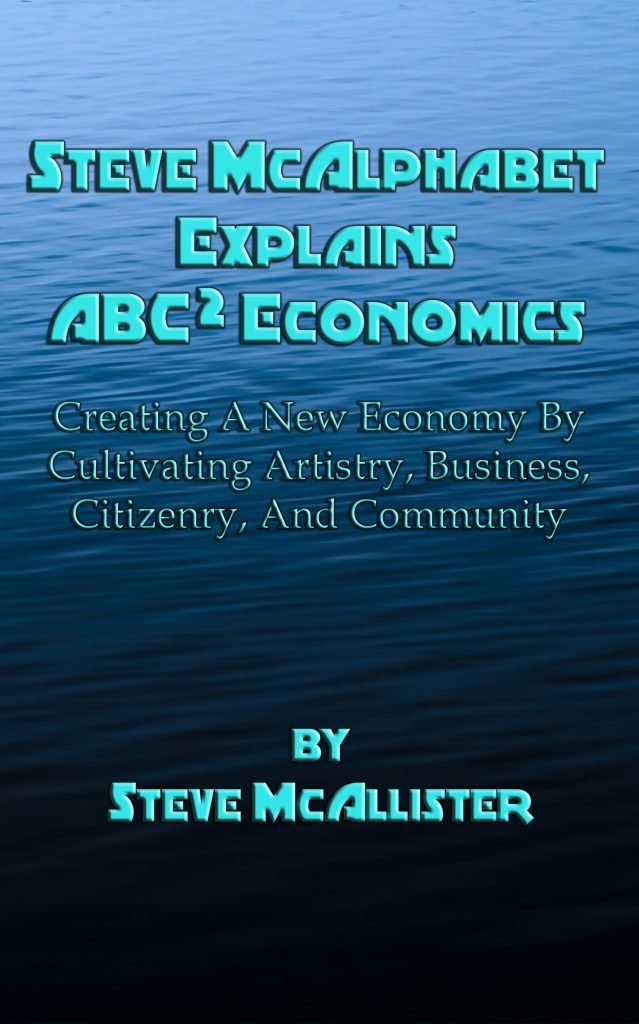The Market Economy is designed so that whomever owns or claims rights to a portion of the planet gets to lay claim to whatever resources that property may have and sell them as products. In all of the writings produced by humanity, at least what we have at our disposal, ever since men started keeping track of things, instituting the Market Economy, it has never been made clear from whom the first owners of any given piece of property purchased it from to begin with or how they claimed the rights to it. And while the Market Economy has been pivotal for many of humanity’s innovations and triumphs over the last few thousand years, the foundation of ignorance it is built upon has resulted in much damage to the Planetary Economy.
As environmental advocate Lester Brown said, “Socialism failed because it couldn’t tell the economic truth; capitalism failed because it couldn’t tell the ecological truth.”
While some would say that capitalism has not failed, but remains as the best economic system ever, they are largely screaming this from inside the bubble of the Market Economy and remain largely unaware that the Planetary Economy exists. But because capitalism is incapable of quantifying the effects it has on the planet as it continues to use property rights to turn resources into waste to produce money, although it can’t account for it, it causes irreparable damages.
“Whenever we engage in consumption or production patterns which take more than we need,” Vandana Shiva explains in Earth Democracy: Justice, Sustainability, and Peace, “we are engaging in violence.”
“As the world’s resources of non-renewable fuels—coal, oil, and natural gas—are exceedingly unevenly distributed over the globe and undoubtedly limited in quantity,” E.F. Schumacher agrees, “it is clear that their exploitation at an ever-increasing rate is an act of violence against nature which must almost inevitably lead to violence between men.”
Of course, violence is nothing new to our species. And although there is nothing written about the very first real estate purchases, looking at the occurrences of history, much of the acquisition of property since was taken by violent force and then ushered into the Market Economy to produce debt and profits for generations to come. In addition, throughout the development of our Market Economy, people themselves have often been violently forced to participate in it or have been acquired to be property in it.
Yet violence against another person, or even a group of people, is one thing, but violence against our own planet is another. While person on person violence will still take its toll on our souls, the abuse we mete out on the planet is abuse against our very selves, as well as future generations. And although this violence may very well be unintentional and unnoticed by most of us, we should recognize the impact of our unconscious activities.
After all, as E.F. Schumacher pointed out, “The real problems of our planet are not economic or technical, they are philosophical. The philosophy of unbridled materialism is being challenged by events.”
While adherents to the Market Economy don’t often have a world view capable of recognizing issues like climate change and peak oil, those with eyes to see recognize that our system of consumerism is taking its toll on the planet and something needs to be done. What we need is a way for people to become part of the solution instead of merely bystanders for the end of life as we know it.
“This is the moment,” says C. Otto Scharmer in Leading from the Emerging Future: From Ego-System to Eco-System Economies, “when what we need most is enough people with the skill, heart, and wisdom to help us pull ourselves back from the edge of breakdown and onto a different path.”
The path of the Market Economy is not wide enough for all of us, and it will eventually reach a dead end. Since it was designed to convert all things into commodities, it has already turned a number of our Core Economy tasks into compensated jobs, like child care and care for the elderly, and it has proven that it will stop at nothing to transform every ounce of our natural resources into digits in a computer server.
“No compromise is possible between the values and power structures of the money economy and living economy systems,” says David Korten in Change The Story, Change The Future: A Living Economy For A Living Earth. “Their differences are irreconcilable. There is no way to produce outsized financial returns to the assets of billionaires, allow the few to monopolize the control of and disrupt Earth’s living systems for a quick profit, and simultaneously maintain the conditions essential to Earth’s life and meet the needs of all.”
Indeed, Market Economy adherents, especially those who’ve become the greatest addicts to the game of finance, will need to check themselves. Many people have been programmed to defend the notion of individual property rights as the single most important matter in human existence, and the unrestricted liberty to amass as much material wealth as possible, largely represented by numbers in a digital account, stands as a testament to our personal sovereignty. In other words, we have an ego problem on our hands.
For Market Economy fundamentalists, it would be beneficial to look back upon the early proponents of the system, and recognize what they saw as its truest purpose beyond ego aggrandizement.
As Daniel Bell point out in The Cultural Contradictions of Capitalism, “no moral philosopher, from Aristotle to Aquinas, to John Locke and Adam Smith, divorced economics from a set of moral ends or held the production of wealth to be an end in itself; rather it was seen as a means to the realization of virtue, a means of leading a civilized life.”
To be fair, many in the Market Economy have virtue. Quite a few have a lot of it. Although the system doesn’t lend itself to benevolence, many people in it do.
“For companies that want to pursue what has often been called the triple bottom line (emphasizing people and planet in addition to profit),” writes Gar Alperovitz in What Then Must We Do? Straight Talk About The Next American Revolution, “the traditional legal structure thus poses challenges – a reality that led private-equity expert Andrew Kassoy to join with two others to found B Lab and invent the B Corporation, a corporate structure that facilitates the use of business profits for social purposes. In a B Corp (also known as a benefit corporation) people who invest know from the outset that the goal is both to make profits and to use some part of them for social purposes.”
Since B Corporations have become legitimized, as of this writing, laws permitting companies to charter themselves as B Corporations have been enacted in 34 states and Washington DC while 6 more have bills in motion, so far. While this is a great step in the right direction, it is one step in a long journey. Truly opening the Market Economy up to giving back to the Core and Planetary Economy will also require a shift in our lifestyles and the ways in which we operate in the world.

This is an excerpt from the book Steve McAlphabet Explains ABC Squared Economics. Go to https://stevemc.xyz/books/steve-mcalphabet-explains-abc-squared-economics/ to find out more.


